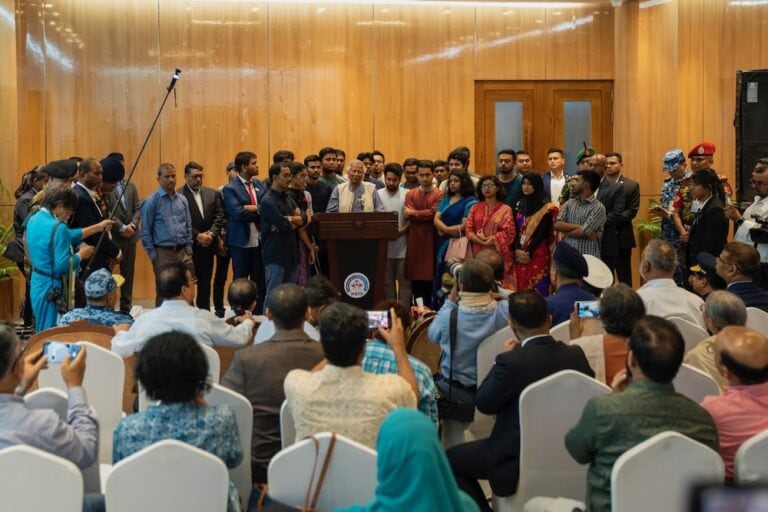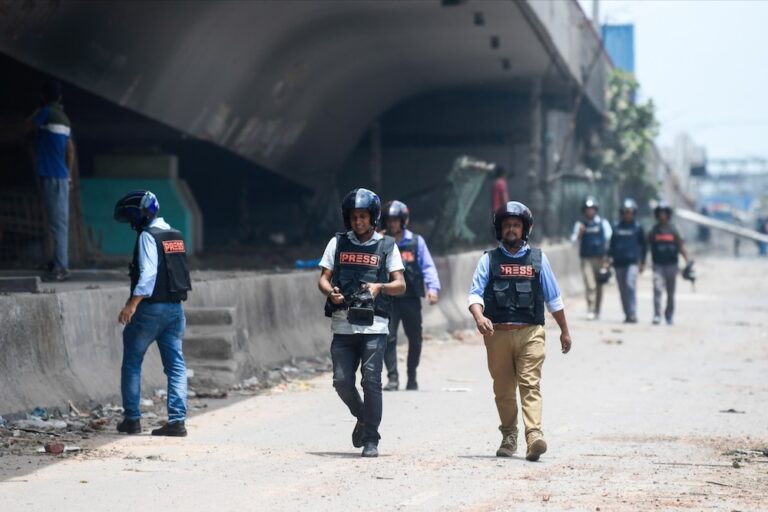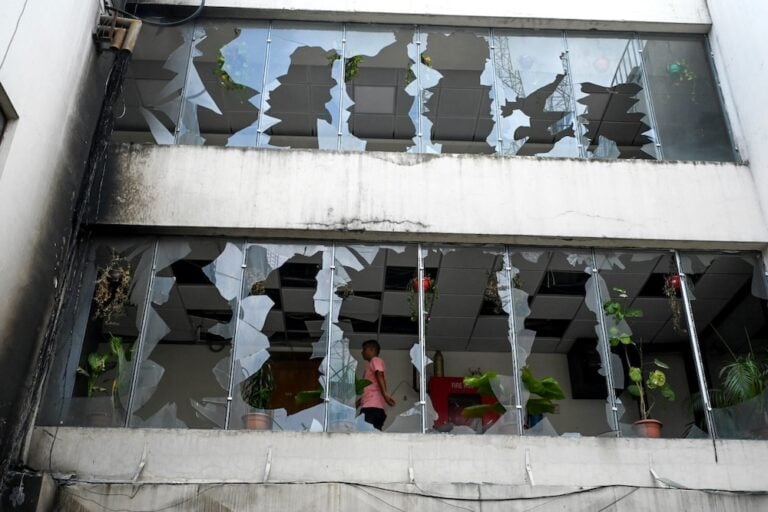(RSF/IFEX) – The following is a 29 November 2001 RSF press release: BANGLADESH At least 40 journalists attacked or threatened by the Begum Khaleda Zia government’s supporters BCDJC and RSF notice that the Prime Minister is not respecting her commitment taken during the electoral campaign In a letter addressed to Prime Minister Begum Khaleda Zia, […]
(RSF/IFEX) – The following is a 29 November 2001 RSF press release:
BANGLADESH
At least 40 journalists attacked or threatened by the Begum Khaleda Zia government’s supporters
BCDJC and RSF notice that the Prime Minister is not respecting her commitment taken during the electoral campaign
In a letter addressed to Prime Minister Begum Khaleda Zia, Reporters Without Borders (RSF – Reporters sans Frontières) and the Bangladesh Centre for Development, Journalism and Communication (BCDJC) again protested against the violence perpetrated by Bangladesh Nationalist Party (BNP) activists against the media. “The multiplication of incidents against journalists implicating ruling party activists discredits the government’s press freedom policy”, asserted Robert Ménard, RSF general secretary. “We want to remind you that the respect for press freedom appeared in your campaign programme. We ask you to meet your commitment”, the BCDJC declared. Both organisations asked Begum Khaleda Zia to exercise her full influence to make the violence stop and to bring the culprits to trial. RSF and BCDJC also requested the immediate release of Shaharier Kabir and withdrawal of the charges against the journalist. He is detained for “possessing inflammatory information which can jeopardise the stability of the country.”
Both organisations noted with satisfaction the government’s decision to ask the police to reopen the inquiries into the murders of seven journalists over the last five years. “Fighting impunity must be a daily struggle, against every attacker, even those from one’s own political camp”, RSF and BCDJC added. Both organisations are ready to collaborate with the police and judiciary to identify the murderers and the people behind the murders.
Since Begum Khaleda Zia’s arrival in power, at least 40 journalists and photographers have been attacked or threatened with death by activists from the new majority, essentially made up of BNP and Jamaat-e-Islami (fundamentalist party). On the single day of 20 October 2001, two dailies were targets of vandalism, two journalists were threatened with death and a reporter was attacked.
According to information gathered by RSF and BCDJC, a group of twenty plainclothes policemen without a warrant raided the office of the newspaper Dainik Al Ameen. After threatening the guard, policemen searched the building, looking for illegal firearms. According to several testimonies, they left after failing to find anything. Dainik Al Ameen is owned by Moqbul Hossain, a former Awami League Member of Parliament accused of corruption.
On 18 November, henchmen of ruling party Member of Parliament Abdul Momen Talukder raided the house of Rafiqul Islam Montu, correspondent of Dainik Karotua in Santahar (north of the country). They manhandled him and took him to Talukder’s home. The MP criticised the journalist for not referring to him as “Honourable” or “Mister” in his articles. The correspondent was insulted before being allowed to leave. The Santahar press club immediately decided to boycott the MP.
On 12 November, activists of the Jatiyatabadi Chattra Dal (JCD), a student organisation close to BNP, attacked Sardar Zobair Hossain, student and correspondent of the Ittefaq daily at Jahangirnagar University. The activists threatened him with death if he didn’t leave the campus. The day before, Sardar Zobair Hossain wrote an article about this student group’s implication in violence and racketeering.
On 11 November, armed activists of the Jatiyatabadi Juba Dal (JJD), the youth section of the ruling nationalist party, burst into a press conference organised in Bagerhat (south-west of the country) by Mozzamel Haque, leader of the Awami league (main opposition party). Babul Sardar, correspondent of the Dainik Janakantha, Binud Prasad Chakrabarti, correspondent of the TV channel ETV and the press agency UNB, Ahad Haider, correspondent of Prothom Alo, Shah-e-Alam Tuku, correspondent of BSS press agency, Azadul Haque, correspondent of the Dainik Runner, and Abdur Rob Mollah, correspondent of the Dainik Janmabhumi in Khulna, were wounded by the attackers. Babul Sardar was seriously wounded in the head and neck. Police arrested five attackers, among them Mahbubur Rahman Tutul, the JJD local leader responsible for the attack.
On 5 November, M.A. Raquib, correspondent of the Dainik Janakantha, and Tariqul Haque Tariq, correspondent of the Dainik Prothom Alo in Kushtia (west of the country), received death threats by post after reporting on a case implicating Bacchu Mollah, the local BNP youth leader and son of the Minister of Telecommunications. Since the publication of an article by Jahirul Islam, correspondent of the Dainik Jugantor in Kushtia, accusing Bacchu Mollah and his henchmen of violence, the relationships between press and authorities has been extremely strained. BNP officers published a press release in which they ordered the press not to write against the son of the Minister. “Some journalists use their profession as a business. We will get our revenge”, the BNP leaders wrote. Jahirul Islam was also under strong pressure and recognised having published wrong information. The Dainik Jugantor dismissed him and the journalist fears for his life. Bacchu Mollah’s relatives have not forgiven Jahirul Islam for publishing an article which led to their leader’s imprisonment.
On 3 November, Sohel Rana, photographer for the Dainik Ajker Kagoj in Chittagong (south-west of the country), was attacked, and his camera was stolen by members of the student movement of the Jamaat-e-Islami (fundamentalist party). The photographer covered a confrontation between the young Islamists and activists of the former ruling party, the Awami League. Sohel Rana protested to an officer of the Islamist movement. His camera was returned and he received an apology.
On 30 October, Rifat bin Tuha, correspondent of the Dainik Janakantha in Narail (south-west of the country), received death threats from BNP activists. They blamed him for having criticised their party. On the same day, BNP supporters attacked a news stand. Hundreds of copies of Dainik Janakantha were burnt on the public square. The journalist also asked that his safety be assured. To date, nothing has been done.
Also on 30 October, activists of the Islami Chattra Shibir, student wing of Jamaat-e-Islami, threatened Akil Poddhar, correspondent of the Dainik Janakantha in Kushtia (west of the country), with death for publishing “anti-Islamic” information. The fundamentalists criticise the daily for its critical articles about Osama bin Laden.
On 26 October, Rafiqul Hasan Tuhin, correspondent of the Dainik Janakantha in Habiganj, (north-west of Bangladesh), was seriously beaten by young activists of the BNP. He has been blamed for writing about repression against the Hindu minority. After being knocked and kicked, Hasan Tuhin was threatened with a knife. The intervention of a police officer allowed him to escape. He had to be hospitalised for several hours. Hasan Tuhin lodged a complaint and asked the police for protection.
On 22 October, Muktar Hossain Golap, correspondent of the Dainik Sangbad in Mitamoin (near Kishoreganj, north-west of Dhaka), was pursued by armed assailants who appear to enjoy protection from the ruling party’s officers. The latter went to the police in order to explain that the assailants used a plastic gun to threaten the journalist. Hossain Golap lodged a complaint against his assailants. The journalist had published an article two days earlier about the existence of arms smuggling in the area, illustrated by a photo of an armed Kishoreganj delinquent. Police refused to hear the journalist’s complaint.
On 21 October, Mamunur Rashid, correspondent of Dainik Janakantha at Dhaka University, was forced to leave the university after receiving threats from JCD activists. They ransacked and occupied his room. The JCD also asked the former general secretary of the Dhaka University Journalists Association to write very “carefully” about them.
On 20 October, a group of armed young men claiming to be members of BNP attacked the office of local newspaper Dainik Shitalakkhya in Narayanganj (port of Dhaka). They stormed the office and journalists were threatened with reprisals if they did not pay a monthly tax to the group. On 25 October, police arrested two of them, known for their criminal and political activities.
On 20 October, delinquents also claiming to be members of the ruling party raided the office of the newspaper Dainik Deshhitoishi in Jessore (south-west of the country). Equipment was destroyed and the vandals left with one newspaper vehicle.
On 20 October, supporters of JCD manhandled and threatened Mohammad Muniruzzaman Munir, correspondent of Dainik Jugantor in Nalchity (south of the country) after the publication of an article entitled “Chattra Dal strikes Nalchity college”.
On 20 October, Mafia boss Abul Shah, who claims to be a BNP member, addressed a threatening letter to Humayun Kabir Mithu, correspondent of Dainik Muktakantha in Daulatpur (near Kushtia, west of the country). “Your newspaper wrote so much against our leader. That is why we will kill you like a dog”, said the letter.
On 20 October, K. M. Reza, correspondent of Dainik Matribhumi in Putia (near Rajshahi, west of the country), was attacked by unknown assailants while waiting at a bus stop in this town close to India. His assailants criticised him for his articles about their implication in cross-border smuggling. The journalist lodged a complaint to the police. A few hours later, the assailants came to his house and threatened him with death if he did not withdraw his complaint. They forcibly took his signature.
On 16 October, Saiful Islam Rob, correspondent of Dainik Jugantor in Agoiljhara (near Barisal, south of the country), was assaulted while on his way to cover a political violence incident. The assailant was not identified but the journalist had recently written an article accusing delinquents close to the BNP of being involved in a racketeering system, collecting tolls from bazaar traders.
On 16 October, Muzaffar Rahman, correspondent of the regional newspaper Dainik Janmabhumi in Tala, near Satkhira (south-west for the country), was threatened with death by the local BNP president. While the journalist was in a meeting with the local Member of Parliament, the BNP leader threatened the journalist with an early death because of his critical articles about the party.
On 14 October, Shaukat Milton, correspondent of Dainik Janakantha in Barisal (south of the country), was threatened with death through a newspaper. Mahbubul Alam Mehdi, a local Mafia boss linked with BNP, published a statement in a local newspaper accusing the journalist of being a liar. The Mafia boss accused Shaukat Milton of writing an article, published on 15 October, about the links between political leaders and local Mafia. Following the protests of Barisal’s journalists’ organisations, the local newspaper expressed its regret. In recent years, Shaukat Milton has received numerous threats from former ruling party supporters.
In October, the Bangladeshi authorities banned the October issue of the Bengali-language magazine Desh, published in India, and censored two pages of Sannanda, a women’s magazine also published in India. The authorities accused Desh of publishing a story by Samaresh Majumder, an Indian writer, about insurgents in the Indian state of Tripura. Some rebels have reportedly taken refuge in Bangladesh. Regarding Sannanda, the government censored the poems that contain descriptions of different religious sculptures that can “hurt the feelings of readers”.


